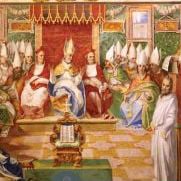Pope Leo XIV – Inaugural Mass Homily
Elected on May 8, 2025, as the 267th successor of St. Peter, Pope Leo XIV’...

The Council of Orange (529 AD) must be seen against the backdrop of the controversy about grace that began a century earlier when Augustine debated the British monk Pelagius (ca. 410 AD). This dispute had to do with degree to which a human being is responsible for his or her own salvation, and the role of the grace of God in bringing about salvation. The Pelagians held that human beings are born in a state of innocence, i.e., that there is no such thing as a sinful nature or original sin. As a result of this view, they held that a state of sinless perfection was achievable in this life. The Council of Orange dealt with a revived form of Pelagian thinking often called Semi-Pelagianism that the human race, though fallen and possessed of a sinful nature, is still “good” enough to able to lay hold of the grace of God through an act of unredeemed human will. For the Semi-Pelagians, human beings can take the first steps toward salvation without grace. The Council clearly reject this view and teaches that grace precedes and enables any step we can possibly take toward God. Yet it also rejects the view of the extreme Augustinians that God could possibly will the damnation of some. It affirms that God wants all to be saved and come to knowledge of the truth. Though this Council was not officially ecumenical, its decrees have been received as an authentic expression of Catholic truth. Unfortunately, the teaching of this Council was virtually lost for over a thousand years. It is tragic that neither Catholics nor Protestants at the time of the Reformation appeared to have known of the council’s teaching. Biography by Dr. Italy